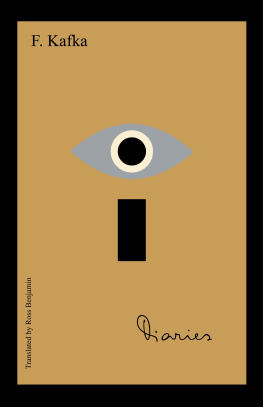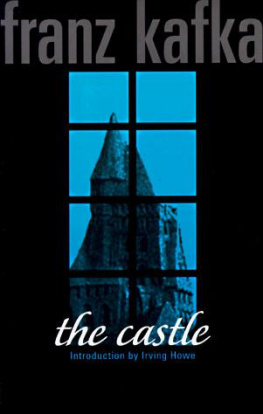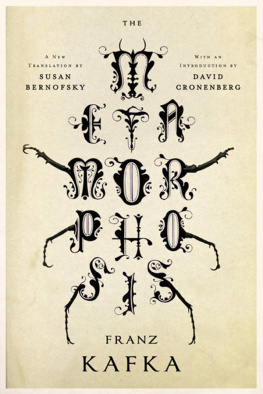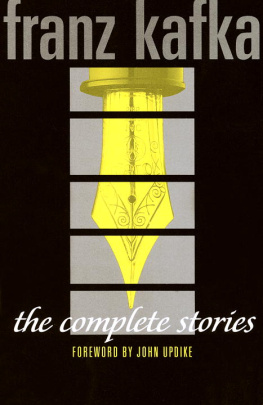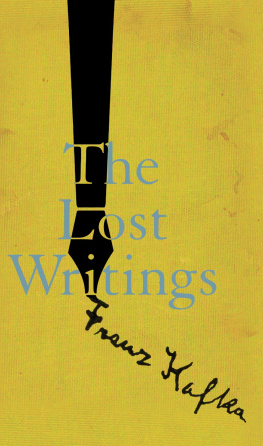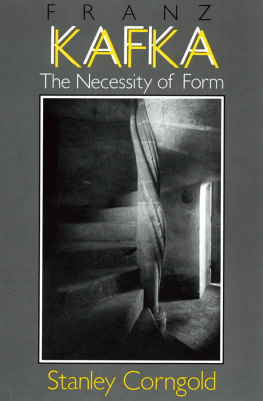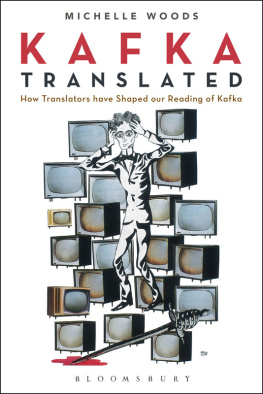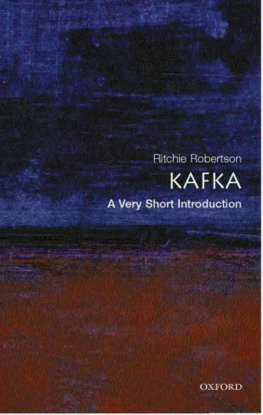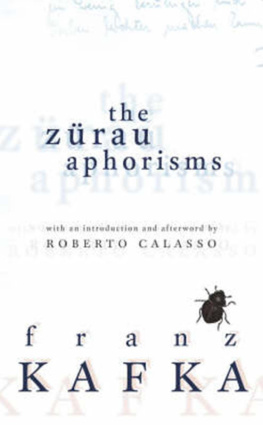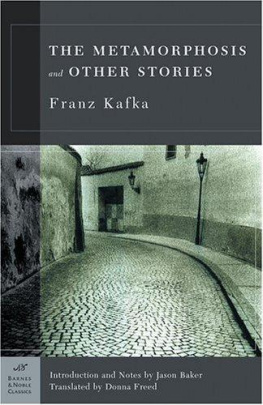Franz Kafka - Amerika: The Man Who Disappeared (New Restored Text Translation)
Here you can read online Franz Kafka - Amerika: The Man Who Disappeared (New Restored Text Translation) full text of the book (entire story) in english for free. Download pdf and epub, get meaning, cover and reviews about this ebook. year: 2004, publisher: New Directions, genre: Adventure. Description of the work, (preface) as well as reviews are available. Best literature library LitArk.com created for fans of good reading and offers a wide selection of genres:
Romance novel
Science fiction
Adventure
Detective
Science
History
Home and family
Prose
Art
Politics
Computer
Non-fiction
Religion
Business
Children
Humor
Choose a favorite category and find really read worthwhile books. Enjoy immersion in the world of imagination, feel the emotions of the characters or learn something new for yourself, make an fascinating discovery.

- Book:Amerika: The Man Who Disappeared (New Restored Text Translation)
- Author:
- Publisher:New Directions
- Genre:
- Year:2004
- Rating:5 / 5
- Favourites:Add to favourites
- Your mark:
- 100
- 1
- 2
- 3
- 4
- 5
Amerika: The Man Who Disappeared (New Restored Text Translation): summary, description and annotation
We offer to read an annotation, description, summary or preface (depends on what the author of the book "Amerika: The Man Who Disappeared (New Restored Text Translation)" wrote himself). If you haven't found the necessary information about the book — write in the comments, we will try to find it.
Amerika: The Man Who Disappeared (New Restored Text Translation) — read online for free the complete book (whole text) full work
Below is the text of the book, divided by pages. System saving the place of the last page read, allows you to conveniently read the book "Amerika: The Man Who Disappeared (New Restored Text Translation)" online for free, without having to search again every time where you left off. Put a bookmark, and you can go to the page where you finished reading at any time.
Font size:
Interval:
Bookmark:

AMERIKA (THE MAN WHO DISAPPEARED)
FRANZ KAFKA was born of Jewish parents in Prague in 1883. The family spoke both Czech and German; Franz was sent to German-language schools and to the German University, from which he received his doctorate in law in 1906. He then worked for most of his life as a respected official of a state insurance company (first under the Austro-Hungarian Empire, then under the new Republic of Czechoslovakia). Literature, of which he said that he consisted, had to be pursued on the side. His emotional life was dominated by his relationships with his father, a man of overbearing character, and with a series of women: Felice Bauer from Berlin, to whom he was twice engaged; his Czech translator, Milena Jesensk-Pollak, to whom he became attached in 1920; and Dora Diamant, a young Jewish woman from Poland in whom he found a devoted companion during the last year of his life. Meanwhile, his writing had taken a new turn in 1917 with the outbreak of the tubercular illness from which he was to die in 1924. Only a small number of Kafkas stories were published during his lifetime, and these are published in Penguin as Metamorphosis and Other Stories. He asked his friend, Max Brod, to see that all the writings he left should be destroyed. Brod felt unable to comply and undertook their publication instead, beginning with the three unfinished novels, The Trial (1925), The Castle (1926) and Amerika (1927). Other shorter works appeared posthumously in a more sporadic fashion.
MICHAEL HOFMANN was born in Freiburg in 1957 and came to England at the age of four. He went to schools in Edinburgh and Winchester, and studied English at Cambridge. He lives in London and Hamburg, and teaches part-time in the English Department of the University of Florida in Gainesville. He is the author of several books of poems and a book of criticism, Behind the Lines, and the translator of many modern and contemporary authors, including Joseph Roth, Wolfgang Koeppen, Durs Grnein and Thomas Bernhard. Penguin publish his translation of Kafkas Metamorphosis and Other Stories and Ernst Jngers World War I memoir, Storm of Steel. He edited the anthology Twentieth-Century German Poetry, published in 2006.
Translated with an Introduction by
MICHAEL HOFMANN
PENGUIN BOOKS
PENGUIN BOOKS
Published by the Penguin Group
Penguin Books Ltd, 80 Strand, London WC2R 0RL, England
Penguin Group (USA) Inc., 375 Hudson Street, New York, New York 10014, USA
Penguin Group (Canada), 90 Eglinton Avenue East, Suite 700, Toronto, Ontario, Canada M4P 2Y3
(a division of Pearson Penguin Canada Inc.)
Penguin Ireland, 25 St Stephens Green, Dublin 2, Ireland (a division of Penguin Books Ltd)
Penguin Group (Australia), 250 Camberwell Road, Camberwell,
Victoria 3124, Australia (a division of Pearson Australia Group Pty Ltd)
Penguin Books India Pvt Ltd, 11 Community Centre,
Panchsheel Park, New Delhi 110 017, India
Penguin Group (NZ), 67 Apollo Drive, Mairangi Bay, Auckland 1310, New Zealand
(a division of Pearson New Zealand Ltd)
Penguin Books (South Africa) (Pty) Ltd, 24 Sturdee Avenue, Rosebank, Johannesburg 2196, South Africa
Penguin Books Ltd, Registered Offices: 80 Strand, London WC2R 0RL, England
www.penguin.com
This translation and Introduction first published as The Man who Disappeared (Amerika) 1996
Published in Penguin Books under the current title 2007
2
Translation and Introduction copyright Michael Hofmann, 1996
All rights reserved
The moral right of the translator has been asserted
Except in the United States of America, this book is sold subject
to the condition that it shall not, by way of trade or otherwise, be lent,
re-sold, hired out, or otherwise circulated without the publishers
prior consent in any form of binding or cover other than that in
which it is published and without a similar condition including this
condition being imposed on the subsequent purchaser
EISBN : 9780141911311
Der Verschollene (The Man Who Disappeared), is the Cinderella among Kafkas three novels: the earliest begun and earliest abandoned; the last to achieve posthumous publication (as Amerika), edited by Max Brod, in 1927; the least read, the least written about and the least Kafka. That said, I agree with Edwin Muir, whose English translation first came out in 1928, that it is the most purely delightful of Kafkas books, and there is a weightier case to be made for it as well not that delight should be lost sight of in the search for meaning.
It seems that Kafka worked on a version (which is now lost) of Der Verschollene from 1911 into the summer of 1912. It went slowly, and he was never happy with it. Then, following the writing of Das Urteil (The Judgement) in a single night (223 September 1912), he embarked on a second version, which went swimmingly. Brod reports on his friends progress:
I quote from my diary notes of the time. 29 September: Kafka in ecstasy, writing all night. A novel set in America. 1 October: Kafka in incredible ecstasy. 2 October: Kafka, continuing very inspired. A chapter finished. I am happy for him. 3 October: Kafka doing well. On the 6 October he read me The Judgement and The Stoker.
By 17 November he had completed six chapters and thought he could finish the novel by Christmas, when he had a week off. In the event, things happened differently. For three weeks, he was distracted by Metamorphosis, experienced increasing difficulties with the novel, and finally put it aside on 24 January 1913. In June, the first chapter, The Stoker, was published as a fragment by Kurt Wolff, and there was some talk of putting it out in another volume, along with The Judgement and Metamorphosis, to be called perhaps Die Shne (The Sons) a suggestion of how Kafka expected to be read. When his copy of The Stoker arrived, Kafka read it aloud to his parents and noted:
Exuberance, because I liked The Stoker so much. In the evening I read it to my parents, there is no better critic than myself, reading aloud to my most reluctantly listening father. Many shallows, in amongst obviously inaccessible depths.
Kafka didnt take up the manuscript again until October 1914, when he completed the Up, up! cried Robinson section (from This was most unfair), and worked on the two final fragments before finally giving up, this time for good. Some of his subsequent judgements were spectacularly harsh as with all his work but he never actually destroyed The Man Who Disappeared, and the time came when he thought his revulsion came from incapacity, and it turned on himself: strength apparently (already) beyond me today. In 1920, reading Milena Jesensks translation of The Stoker into Czech, he approved of her rendition of in his exuberance, and because he was a strong lad, while suggesting she should leave it out altogether, so little sympathy did he have left for his strikingly young, forthright, cheerful and brave hero. Not only did Kafka expect his writing to reflect himself (and to be better than himself), but to go on doing so.
The version that Brod published in 1927 differs from the present one in at least one matter of substance, and many of detail if there is such a thing as a detail with Kafka. The substance is the section Up! Up, cried Robinson and the first of the fragments, Bruneldas Departure, never previously presented in English. The details range from the title of the book which, though he may have spoken to Brod about his American novel, is only twice referred to in writing, both times as
Font size:
Interval:
Bookmark:
Similar books «Amerika: The Man Who Disappeared (New Restored Text Translation)»
Look at similar books to Amerika: The Man Who Disappeared (New Restored Text Translation). We have selected literature similar in name and meaning in the hope of providing readers with more options to find new, interesting, not yet read works.
Discussion, reviews of the book Amerika: The Man Who Disappeared (New Restored Text Translation) and just readers' own opinions. Leave your comments, write what you think about the work, its meaning or the main characters. Specify what exactly you liked and what you didn't like, and why you think so.



